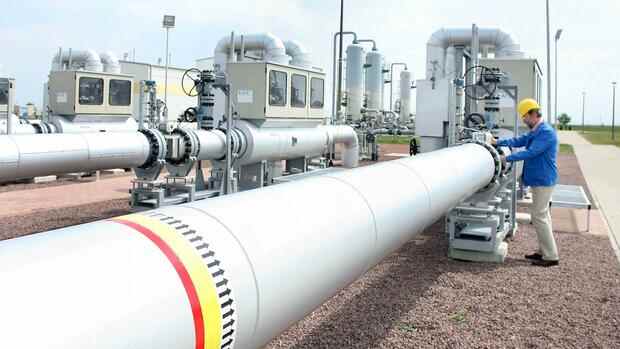From 2021 onwards, the company will be importing another 3.5 billion cubic meters per year from Russia.
(Photo: AP)
Dusseldorf, Berlin In the German energy industry, fears of gas supply failures from Russia are growing. According to information from the Handelsblatt, after Uniper, a second major gas importer, Verbundnetz Gas (VNG), also wants to secure itself with a loan worth billions from KfW in the event of an emergency. According to industry circles, VNG has submitted a corresponding application.
When asked, the company stated that for the future it “cannot be completely ruled out that there will be developments in a short period of time that could put a heavy strain on VNG’s currently comfortable financial situation”. It went on to say: “In order to be prepared for all eventualities, VNG is in contact with the responsible offices of the federal government and the associations.”
In circles of the Federal Ministry of Finance it has been confirmed that in addition to the Uniper application there is at least one other application for a loan option from KfW. According to industry circles, this is at most in the volume of Uniper’s credit option. The Düsseldorf-based company had already confirmed at the turn of the year that it had applied for a KfW credit facility of two billion euros.
The Handelsblatt also has information from government circles that an energy company has applied for a KfW loan of 5.5 billion euros. According to Welt am Sonntag, which first reported on it, it is a power plant operator.
Top jobs of the day
Find the best jobs now and
be notified by email.
The reason why the companies need so much liquidity is the high gas prices on the spot market. On the one hand, traders make a lot of money from it because they bought the gas at cheaper rates and can now resell it at a significant profit. At the same time, they have to pay security deposits – so-called margins – in advance for guaranteed gas deliveries.
Risk situation so far “extraordinary but manageable”
These margins correspond to the difference between the current spot market prices and the contractually agreed price with the respective customer. The money is transferred to the customer via neutral bodies and only comes back when the dealers deliver the promised amount. Until then, companies like Uniper and VNG will have to hold the necessary money for the high payments.
Based in Leipzig, VNG is one of the largest companies in eastern Germany and is part of the EnBW group. Along with Uniper, RWE and the Gazprom subsidiary Wingas, the company is one of the largest gas traders in the country and also imports gas from Russia on a large scale.
Only in 2019 did the company boast that it had signed an additional supply contract with Gazprom. From 2021, another 3.5 billion cubic meters will be imported from Russia each year. VNG had already signed a contract for 6.5 billion cubic meters that runs until 2031. VNG also purchases gas from Norway and buys it on the spot market.
However, there are currently massive distortions on the spot market. Last week, the price for one megawatt hour (MWh), which corresponds to almost 100 cubic meters, climbed to more than 300 euros. That’s more than ten times the price a year ago.
After the gas prices rose to 90 euros per MWh last year due to a sharp increase in demand and increasing nervousness in trading, prices have literally shot up since the start of the Russian invasion of Ukraine. It is feared that Russia, which supplies around 40 percent of European demand, could default – because Europe could decide to boycott, or Russia could stop deliveries itself as a counter-sanction.
>> Read also: Fears of a gas supply stop are growing in the energy sector
That would be a huge problem for gas wholesalers. They had agreed low prices in the long-term contracts and resold the quantities to their own customers – municipal utilities and industry – with a surcharge. If the deliveries break off, they have to buy the quantities on the spot market – at the current maximum prices.
The war in Ukraine is having a massive impact on the global and European energy markets, explained VNG. As of today, the effects on business operations and the risk situation of the VNG Group as a company in the gas industry are “extraordinary and challenging, but manageable”. It also said: “VNG was also able to meet the increased liquidity requirements from the extreme market movements (margin calls) on the energy exchanges from a solid financial position.”
More: Gas price breaks all records – call for a price cap

